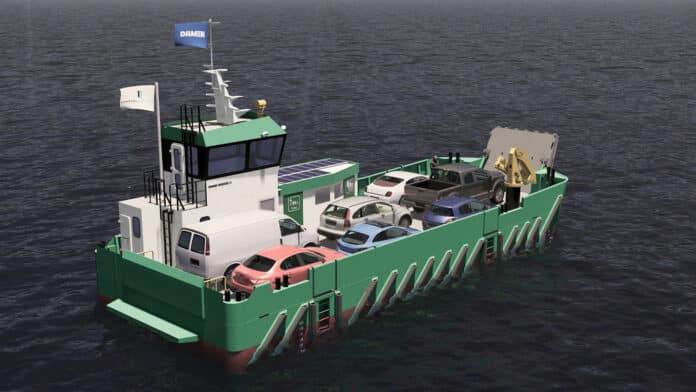British shipbuilding firm Coastal Workboats has agreed to collaborate with EST-Floattech, a maritime energy storage provider, on battery technology. EST-Floattech will be supplying the battery system for the specialized Electric-Landing Utility Vessel (E-LUV) set to be built at Coastal Workboats’ new yard in Stornoway, as well as the Shore-based Power Supply System (SPSS).
This partnership is a major step forward in reducing emissions in the UK’s maritime industry, thanks to EST-Floattech’s technology. Coastal Workboats received a £6 million (€7 million) grant to showcase the UK’s first commercial electric workboat and charging station. This grant highlights the industry’s recognition of the urgent need for cleaner, more environmentally friendly maritime operations. This grant will pave the way for the use of electric workboats in a commercial setting.
The vessel that will be built, the E-LUV, is set to be the UK’s first commercial electric workboat. This innovative ferry, designed for Ro-Ro and dry cargo transportation, will be powered by 2400 kWh of EST-Floattech’s Octopus High Energy battery system. The battery system will be placed as two independent units on board, powering various equipment and enabling fully electric sailing.
The E-LUV will initially operate as a demonstration vessel in the Shetland Isles, operating between West Burrafirth and Papa Stour. The 45-minute route will be sailed twice per day, five days per week, showcasing the potential of energy storage solutions in maritime applications.
Additionally, EST-Floattech will provide a 20-foot container with 1,200 kWh of battery capacity to support E-LUV charging, which can also be used as a range extender when placed on board. The system integration will be handled by MJR Power & Automation, while Renew Marine Ltd. will place the entire system inside the container.
The E-LUV ferry is going to be a game-changer in the transportation industry. It will adhere to high safety and quality standards and also have an eco-friendly focus with its emission-free voyages. Coastal Workboats and EST-Floattech are working together to create such an innovative and sustainable vessel.
“Our attraction to the Octopus Series quite simply comes down to safety. EST-Floattech has produced a class-approved product that brings to market a level of safety unseen previously,” Coastal Workboats’ Chief Engineering Manager Luke Parnell said. “In particular, the passive nature of the heat dissipation system represents a marked step forward in safety, particularly for an application in the marine environment. Given our primary concern is safety above all, the Octopus was the perfect choice for us.”
This collaboration between Coastal Workboats and EST-Floattech marks a significant stride towards achieving the UK’s environmental targets and demonstrates the power of innovation in the maritime sector.
The fully electric inter-island workboat demonstration project is part of the Clean Maritime Demonstration Competition Round 3 (CMDC3). The UK Government has allocated £60m to 19 flagship projects supported by 92 UK organizations to deliver real-world demonstration R&D projects in clean maritime solutions. These projects will take place in multiple locations around the UK, from as far north as the Shetland Isles and as far south as Cornwall.
The CMDC3 is part of the UK Shipping Office for Reducing Emission’s (UK SHORE) flagship multi-year CMDC program. The Department for Transport allocated £206m to UK SHORE, a new division focused on decarbonizing the maritime sector. UK SHORE is delivering a suite of interventions throughout 2022-2025 aimed at accelerating the design, manufacture, and operation of UK-made clean maritime technologies and unlocking an industry-led transition to Net Zero.
